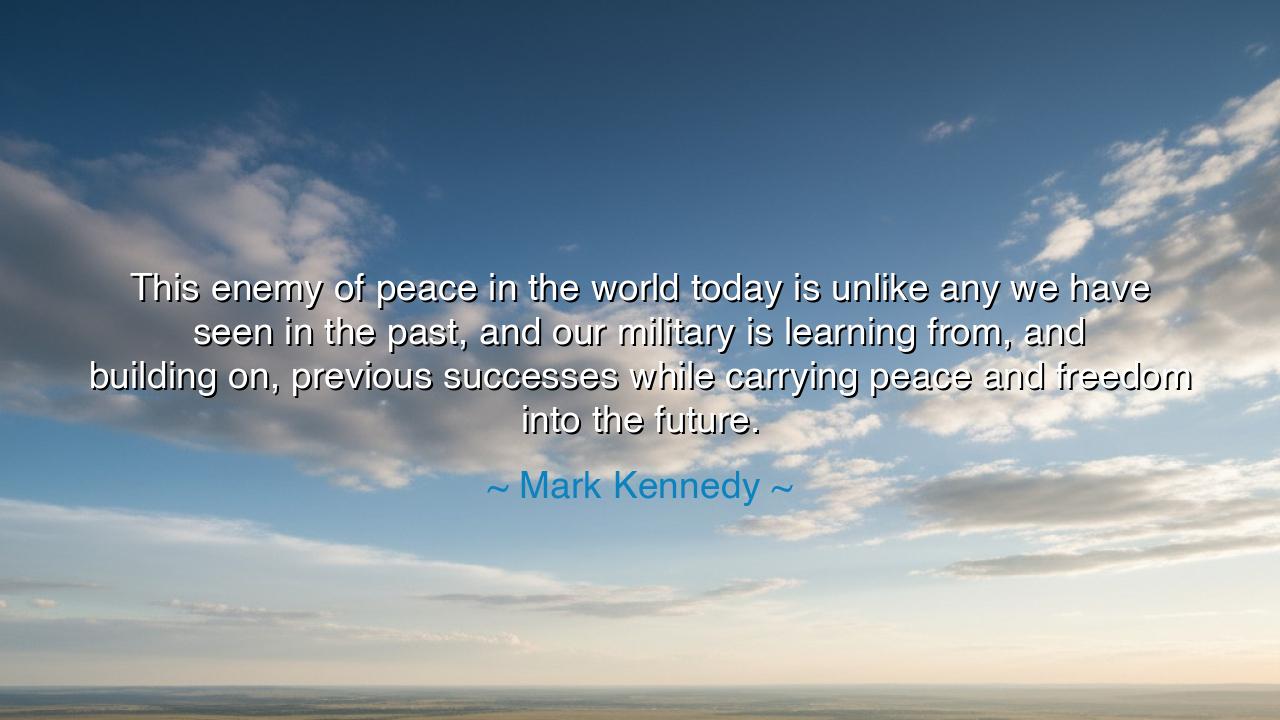
This enemy of peace in the world today is unlike any we have seen
This enemy of peace in the world today is unlike any we have seen in the past, and our military is learning from, and building on, previous successes while carrying peace and freedom into the future.






Mark Kennedy once proclaimed with the gravity of one who speaks for his people: “This enemy of peace in the world today is unlike any we have seen in the past, and our military is learning from, and building on, previous successes while carrying peace and freedom into the future.” His words echo with the solemnity of ages, for every generation has faced adversaries who sought to shatter order and plunge the world into strife. Yet Kennedy declares that the nature of today’s struggle is new—subtler, more elusive, and demanding wisdom that reaches beyond the battles of the past.
When he names the enemy of peace, he does not point only to soldiers or nations, but to the forces of chaos that rise in many guises—terrorism, extremism, division, and the shadowy hands that sow fear. Unlike the foes of old who marched with banners and armies, today’s adversaries strike in secret, across borders and within communities. It is this unseen, unpredictable nature that Kennedy marks as unlike any past struggle. His words call us to vigilance, for peace is not destroyed only by open war, but by the slow erosion of trust, justice, and unity.
And yet, in this darkness, Kennedy turns our eyes to strength. He speaks of the military learning—a reminder that wisdom is not frozen in the past, but grows from it. Just as a tree adds rings each year, so too do nations gain resilience from each trial. The campaigns, victories, and even failures of history are not forgotten; they become stepping stones. This is an ancient principle: the warrior who remembers yesterday fights more wisely tomorrow. In Kennedy’s words, we hear the call to adapt, to evolve, to let the lessons of history forge a stronger defense for the generations yet to come.
History provides shining examples. After the devastation of World War I, many nations faltered in the belief that such a war could never happen again. They neglected to learn, and thus the world was thrust into World War II, a storm far greater than the first. Yet after that second trial, humanity labored to create institutions like the United Nations and NATO, imperfect yet enduring attempts to safeguard peace. Here lies Kennedy’s truth: only by building on successes—by learning from the ashes of the past—can a people hope to prevent the fire from rising again.
But Kennedy’s words are not only about war; they are also about destiny. He speaks of carrying peace and freedom into the future, as though they were sacred torches passed from one generation to the next. The ancients would have called this a covenant: that the living must bear hardship, sacrifice, and vigilance so that their children may inherit not chains, but liberty; not ruin, but flourishing. In these words we hear the eternal mission of every just society: to protect not only borders, but the dignity of life itself.
The lesson is clear: each age faces an enemy of peace, and each age must respond not with fear, but with courage, wisdom, and adaptability. We cannot cling to the victories of yesterday as though they are enough; we must transform them into new strength for the battles of today. Just as the farmer must till anew each season, so too must societies renew their vigilance and their commitment to peace.
So let this teaching guide us: do not despair before the strangeness of new challenges. Instead, honor the past by learning from it, and honor the future by carrying forward the eternal values of peace and freedom. For the enemy may change its face, but the duty of the brave remains the same. Stand firm, adapt wisely, and hold fast to the truth that no matter how the world shifts, the human spirit—if disciplined, united, and courageous—can always rise to defend what is just. In this lies the path of strength, the legacy of the past, and the hope of tomorrow.






AAdministratorAdministrator
Welcome, honored guests. Please leave a comment, we will respond soon